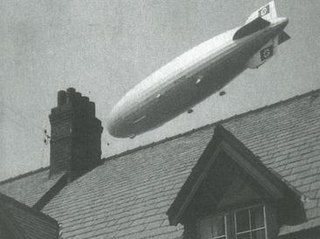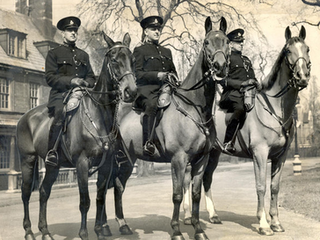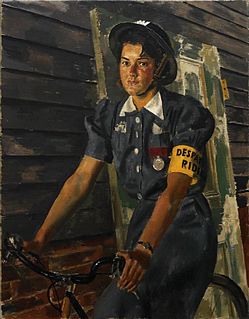Related Research Articles

The Blitz was a German bombing campaign against the United Kingdom in 1940 and 1941, during the Second World War. The term was first used by the British press and originated from the term Blitzkrieg, the German word for 'lightning war'.

Air Raid Precautions (ARP) refers to a number of organisations and guidelines in the United Kingdom dedicated to the protection of civilians from the danger of air raids. Government consideration for air raid precautions increased in the 1920s and 30s, with the Raid Wardens' Service set up in 1937 to report on bombing incidents. Every local council was responsible for organising ARP wardens, messengers, ambulance drivers, rescue parties, and liaison with police and fire brigades.
The George Cross (GC) is the highest award bestowed by the British government for non-operational gallantry or gallantry not in the presence of an enemy. In the British honours system, the George Cross, since its introduction in 1940, has been equal in stature to the Victoria Cross, the highest military gallantry award. It is awarded "for acts of the greatest heroism or for most conspicuous courage in circumstance of extreme danger", not in the presence of the enemy, to members of the British armed forces and to British civilians. Posthumous awards have been allowed since it was instituted. It was previously awarded to residents of Commonwealth countries, most of which have since established their own honours systems and no longer recommend British honours. It may be awarded to a person of any military rank in any service and to civilians including police, emergency services and merchant seamen. Many of the awards have been personally presented by the British monarch to recipients or, in the case of posthumous awards, to next of kin. The investitures are usually held at Buckingham Palace.

The George Medal (GM), instituted on 24 September 1940 by King George VI, is a decoration of the United Kingdom and Commonwealth, awarded for gallantry "not in the face of the enemy" where the services were not so outstanding as to merit the George Cross.

The Conspicuous Gallantry Medal (CGM) was, until 1993, a British military decoration for gallantry in action for petty officers and seamen of the Royal Navy, including Warrant Officers and other ranks of the Royal Marines. It was formerly awarded to personnel of other Commonwealth countries. In 1943 a Royal Air Force version was created for conspicuous gallantry in action against the enemy in the air.

The Belfast Blitz consisted of four German air raids on strategic targets in the city of Belfast in Northern Ireland, in April and May 1941 during World War II, causing high casualties. The first was on the night of 7–8 April 1941, a small attack which probably took place only to test Belfast's defences. The next took place on Easter Tuesday, 15 April 1941, when 200 Luftwaffe bombers attacked military and manufacturing targets in the city of Belfast. Some 900 people died as a result of the bombing and 1,500 were injured. High explosive bombs predominated in this raid. Apart from those on London, this was the greatest loss of life in any night raid during the Blitz.

The Civil Defence Service was a civilian volunteer organisation in Great Britain during World War II. Established by the Home Office in 1935 as Air Raid Precautions (ARP), its name was officially changed to the Civil Defence Service (CD) in 1941. The Civil Defence Service included the ARP Wardens Service as well as firemen, fire watchers, rescue, first aid post and stretcher parties. Over 1.9 million people served within the CD and nearly 2,400 lost their lives to enemy action.

The Manchester Blitz was the heavy bombing of the city of Manchester and its surrounding areas in North West England during the Second World War by the German Luftwaffe. It was one of three major raids on Manchester, an important inland port and industrial city; Trafford Park in neighbouring Stretford was a major centre of war production.

The Birmingham Blitz was the heavy bombing by the Nazi German Luftwaffe of the city of Birmingham and surrounding towns in central England, beginning on 9 August 1940 as a fraction of the greater Blitz, which was part of the Battle of Britain; and ending on 23 April 1943. Situated in the Midlands, Birmingham, the most populous British city outside London, was considered an important industrial and manufacturing location. Around 1,852 tons of bombs were dropped on Birmingham, making it the third most heavily bombed city in the United Kingdom in the Second World War, behind London and Liverpool.

The Coventry Blitz or Coventration of the city was a series of bombing raids that took place on the British city of Coventry. The city was bombed many times during the Second World War by the German Air Force (Luftwaffe). The most devastating of these attacks occurred on the evening of 14 November 1940 and continued into the morning of 15 November.

The Bristol Blitz was the heavy bombing of Bristol, England, by the Nazi German Luftwaffe during the Second World War. Due to the presence of Bristol Harbour and the Bristol Aeroplane Company the city was a target for bombing, and was easily found as enemy bombers were able to trace a course up the River Avon from Avonmouth using reflected moonlight on the waters into the heart of the city. Bristol was the fifth most heavily bombed British city of World War II.

The Queen's Commendation for Brave Conduct, formerly the King's Commendation for Brave Conduct, acknowledged brave acts by both civilians and members of the armed services in both war and peace, for gallantry not in the presence of an enemy. Established by King George VI in 1939, the award was discontinued in 1994 on the institution of the Queen's Commendation for Bravery.
Michael Gibson, GC was a British Army soldier who was posthumously awarded the George Cross for the conspicuous gallantry he displayed in Coventry on 14 September 1940 in defusing a large unexploded bomb.

The Cardiff Blitz ; refers to the bombing of Cardiff, Wales during World War II. Between 1940 and the final raid on the city in March 1944 approximately 2,100 bombs fell, killing 355 people.

The Barrow Blitz is the name given to the Luftwaffe bombings of Barrow-in-Furness, United Kingdom during World War II. They took place primarily during April and May 1941, although the earliest Luftwaffe bombing occurred in September 1940. VSEL shipyard was the main target for bombing alongside Barrow's steelworks which were formerly the largest in the world.

There have been five equine recipients of the Dickin Medal since its creation in 1943. The first three were British horses Regal, Olga, and Upstart, followed by the Canadian Corps Cavalry horse Warrior and the American Sergeant Reckless. The first three received their awards at a ceremony on 11 April 1947 at Hyde Park in recognition of the courage they exhibited during World War II. These three were mounts used by members of the Metropolitan Police Service during official duties and to aid civilians during the Blitz and later bombings from September 1940 to late 1944. Warrior served on the Western Front during World War I and was awarded an honorary posthumous medal in September 2014. Another posthumous award was given in 2016 to Sergeant Reckless, a mare who served during the Korean War with the United States Marine Corps and was given the rank of staff sergeant. Of the recipients, three were honoured for courage during active duty, one for remaining calm when his stable was bombed on two occasions and one to commemorate the actions of animals during the First World War. The first three horses were selected primarily as a way to honour the entire mounted police force instead of singling out any particular deed. Olga, Upstart and Regal are buried at the Metropolitan Police Mounted Training Establishment at Thames Ditton which also displays their medals in a museum.
The Bronze Cross Medal is the highest award for gallantry that the Scout Association can bestow on adult and child members of the movement.

Charity Anne Bick was a British civilian dispatch rider during the Second World War, and the youngest ever recipient of the George Medal, the United Kingdom's second-highest award for civilian bravery. She later served in the Women's Royal Air Force.
Police Auxiliary Messengers (PAMS) were operational in the UK during World War 2. Young lads under the age of eighteen with their own bikes were employed by local police forces with the primary role of taking messages during and after air raids if telephone communication was not practicable.

Gillian Kluane Muirhead Tanner was a British firefighter. Tanner was the only female firefighter to be awarded the George Medal during the Second World War.
References
- ↑ "Greater London South Scouts Roll of Honour". Archived from the original on 8 December 2015. Retrieved 28 November 2015.
- ↑ "Brave Scout-WW2 in Bermondsey" . Retrieved 28 November 2015.
- ↑ They Were Prepared. London: UK Scout Association. 1941. p. 17.